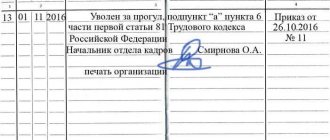If your employer fired you without warning, without legal grounds, do not despair. In this article we will suggest ways to solve this problem. To dismiss an employee, there must be grounds expressly provided for by the Labor Code of the Russian Federation, and the dismissal procedure must be followed. In case of any of these violations, the employee can be reinstated in his job. Even those employees with whom employers have not formalized an employment relationship have the right to protect their interests. The main thing is not to put up with the current situation and go towards your goal to the end.
Can an employer fire without cause?
Labor legislation contains many different guarantees of the labor rights of workers. Such guarantees include, among other things, a ban on dismissing employees without any reason. All grounds on which employees can be dismissed are directly provided for by the Labor Code of the Russian Federation.
In general, they can be divided into dismissals:
- At the request of the employee;
- At the request of the employer.
Any dismissal of an employee must be justified and legal.
The employer is obliged to comply with the dismissal procedure provided for by the current legislation of the country. Dismissal without reason, as well as dismissal in violation of the procedure established by law, can be appealed by the employee in court.
What kind of dismissal is considered unlawful?
The paragraphs of the Labor Code contain not only a comprehensive register of grounds for termination of the contract, but also the procedure for drawing up such a general decision. Any deviation from legal norms gives a person the opportunity to make claims to the former management. In particular, this is possible in the following situations:
- upon dismissal without legitimate justification (not described in the order);
- in case of deviation from the order of the procedure, for example, without issuing a guidance document;
- when indicating reasons that did not actually occur;
- in case of violation of the employee’s rights guaranteed by current legislation;
- when imposing a penalty without justification;
- upon termination of a contract without taking into account the family and physical condition of the employee: pregnant;
- minor;
- parent of two or more minors, a disabled child;
Attention: coercion to submit an application to terminate a contract at one’s own request can also be considered an invalid reason if it can be proven in court.
What to do if a conflict arises in the workplace
Labor legislation provides workers with a lot of opportunities to resist the arbitrariness of management. However, you must proactively take a number of steps to protect yourself. Namely:
- Request a copy of the T-2 form card or personal file. The document reflects all personnel orders regarding the employee. A copy is required for defense in court;
- Submit an application of desire to receive: a copy of the administrative document on dismissal (must have registration details);
- certificate-calculation;
- orders to impose penalties;
In order for these materials to be handed over to the dismissed person, they must be requested in writing. The application is written in two copies:
- one is transferred to management;
- on the second, the relevant specialist (secretary) must put the date of reception and his own signature.
Advice: a person who wants to fight the arbitrariness of his superiors should not take away his work book. As long as the main document is in the possession of the employer, the contract is not considered terminated.
What can you demand from a manager who fired you wrongfully?
Requirements for superiors are individual in nature. Thus, an offended worker has the right to the following legal privileges:
- reinstatement at duty station;
- cancellation of illegally imposed penalties;
- changing the wording in the work book and, accordingly, the dismissal order;
- receiving compensation;
- compensation for moral damage.
Hint: management is obliged to reimburse the employee for funds lost as a result of forced absence. This happens if the court finds the reason for dismissal to be unlawful.
Dismissal at your own request
Each employee can submit a resignation letter at any time of his own free will. He must do this 2 weeks before the expected date of dismissal. The employer does not have the right to unilaterally reduce these terms and dismiss an employee before their expiration. The fact is that during these 2 weeks the employee has the right to change his mind and withdraw his application. This means that his early dismissal will be a violation of this right.
Attention! The two-week warning period can be reduced by mutual agreement of the employee and employer.
What to do when you quit
First, you should think about why management suddenly decided to part with you. If the company is not having the best of times, then an option such as voluntarily submitting an application will be beneficial to the employer.
He will not have to carry out staff reductions and pay benefits to laid-off employees. In this case, it is better not to follow the lead, but to firmly say “no”.
At the same time, you should understand that a thrifty manager will not give up hope of getting rid of you as cheaply as possible, so you will have to become a model of discipline and productivity.
In case of dismissal for violation of discipline or internal regulations of the company, you need to calmly go to court and try to recover, moreover, force the employer to pay for the forced absence.
Read whether maternity capital is divided between spouses during a divorce. Child support after 18 years of age if the child is studying legally. More details here.
To behave correctly and act strictly in your own interests, you need to know:
- Labor Code
- your job responsibilities and terms of the employment agreement
- address of Rostrudinspektsiya
- the way to the law office.
It also wouldn’t hurt to have reliable people who can confirm your testimony and statements (on issues of work, discipline, and other useful evidence).
Pensioner
Pensioners work and retire on a general basis. However, when problems arise at the company, employers often try to solve them at the expense of the employees - by dismissing them without appropriate payments, not by layoff, but by forcing them to write a letter of resignation on their own.
Underpayments also occur: during layoffs, for vacations, and other cases of incorrect calculation.
Elderly people have a certain advantage: during layoffs, they are supposed to be fired last, as the most experienced specialists.
However, in other cases, they are often simply forced to leave on their own initiative, often resolving the issue with the help of an agreement: offering them a ridiculous amount and at the same time applying pressure.
You should know that if you disagree with the terms of the agreement, the employee cannot be fired. Also, the employer does not have the right to fire without good reason, only on the basis of unfounded accusations.
If he makes an attempt to get rid of an older worker on the basis of inadequacy for his position, then in this case an certification commission must be assembled, the decision of which can also be challenged.
In such cases, a citizen of retirement age must apply to the court: this will solve the problem of restoring him to his previous place, receiving underpaid money, as well as compensation for humiliation and moral damage.
Without a reason
You can’t just fire someone like that.
If management starts looking for reasons, that is:
- suddenly shows increased interest in an individual employee, which was not previously observed
- begins to give some tasks that distract from the main work
- starts emotional conversations out of the blue
- diligently watches the time of appearance at the workplace
- additional requirements appear
- shortcomings are constantly being looked for in the work, which the employee is informed about daily
- There is always a person nearby who draws everyone’s attention to the shortcomings found, during the time spent by the employee on lunch or a cigarette break
- other unpleasant moments that create nervous tension - then we can assume that there is a possibility of dismissal in the near future. In principle, you can try to catch up and work better, show up every minute, demonstrate your interest in continuing the employment relationship. At the same time, it doesn’t hurt to make friends who will see timely arrivals, departures, and lack of downtime.
Dismissal at the initiative of the employer (Article 81 of the Labor Code of the Russian Federation)
All the grounds on which the employer has the right to dismiss employees on his own initiative are expressly provided for in Art. 81 Labor Code of the Russian Federation. They can be divided into 2 types:
- Dismissals related to illegal acts of an employee (for example, failure to perform work duties, absenteeism, showing up at work while drunk, etc.);
- Dismissals not related to illegal acts of the employee (for example, liquidation or termination of the employer, staff reduction).
Each case has its own dismissal procedure. So, for example, upon dismissal due to staff reduction, the employer is obliged to notify the dismissed employees 2 months in advance, with payment of certain compensation to them. And if an employee is dismissed for committing an unlawful act, an investigation must be carried out with its results recorded in the report.
The law provides for cases when employers do not have the right to fire their employees at all. Such cases include, but are not limited to:
- Dismissal of an employee while he is on sick leave or on vacation;
- Dismissal of a pregnant employee, or an employee on maternity leave, etc.
It might be interesting!
What to do if the employer does not pay upon dismissal?
When does an employer have the right to fire an employee without notice?
Notification of dismissal in advance is not necessary in the following situations:
- submission of false documents during employment;
- not suited for the position, failure of certification;
- systematic violation of the employment contract;
- gross failure to fulfill official duties (absenteeism, appearing drunk, theft, disclosure of trade secrets, violation of labor safety rules, which led to an accident or accident);
- immoral act (for workers in the educational and pedagogical sphere);
- loss of trust as a result of harm.
The manager, deputy director, or chief accountant can be dismissed without warning by higher management when the owner of the organization changes. Dismissal without notice is permitted if the chief accountant or manager made an erroneous decision that resulted in damage to the owner of the company.
Unilateral dismissal by an employer in case of unofficial employment
In most cases, employers allow themselves to dismiss employees without reason and without advance warning if these employees are employed informally. They mistakenly believe that workers in this case will not be able to protect their rights, since they do not have properly executed documents in their hands.
At the same time, the law allows such employees to recognize in court the fact of the existence of an employment relationship with a specific employer and be reinstated to work even without an employment contract and book.
As evidence of work activity, the courts accept any documents by which the specified fact can be reliably proven, for example, pay slips, employee statements endorsed by the manager, assignments from management, reports on work performed, correspondence, witness statements, recordings from CCTV cameras and others proof.
What to do if your employer forces you to resign at your own request
The most beneficial situation for the employer is when the employee independently declares his desire to leave, since in this case the company does not bear any legal liability. Therefore, employees are often forced to resign of their own free will, using various psychological tricks.
| Form of coercion | Description and examples |
| Open request | The manager directly asks the employee to sign the statement, explaining his decision for various reasons (“it will be better for both parties,” “you are not coping with your responsibilities,” etc.). |
| Blackmail | The manager issues an ultimatum: either the employee signs the application, or he will be fired under a “serious” article, damaging information will be transmitted about him (for example, stealing money from the cash register, absenteeism, etc.). |
| Moral pressure | Creating unbearable conditions at work - nitpicking over trifles, incorrect communication, hints or direct insults, survival with the help of the team (a person can become an outcast). |
| Manipulation of facts | The employee is provoked to violate labor discipline (for example, he is given a task, he leaves to complete it, after which the manager accuses him of absenteeism), after which he is fired under the relevant article. |
In rare cases, an employer commits a gross violation of the law and forges a statement from an employee, in which he allegedly asks to be relieved of his position at his own request. Methods such as causing harm to health or property are extremely rarely used.
When a company asks you to resign of your own free will, signing the application is highly discouraged. If you succumb to provocation, it will be very difficult to prove the facts of psychological pressure in court (in the absence of appropriate audio recordings, documents and other materials).
In such cases, the employee should collect the maximum amount of documentary evidence and other materials to justify his position. Then you need to take the complaint to the labor inspectorate or prosecutor's office as quickly as possible. If these measures do not work, you should file a lawsuit for illegal dismissal.
Contacting the State Tax Inspectorate and the Prosecutor's Office
An illegally dismissed employee may file a complaint with the State Tax Inspectorate and the prosecutor's office. This can be done at the same time. Applications are drawn up in any form, and, in principle, can be almost identical.
Such statements must contain:
- The name of the body to which it is addressed;
- Full name, place of work, contacts and address of the applicant;
- Circumstances of the case, including information about the concluded employment contract, illegal dismissal and other violations by the employer;
- Request to conduct an inspection and eliminate the violation of the employee’s rights;
- Employee signature;
- Date of.
The procedure for reinstatement of an employee
If the court decides to declare the dismissal illegal, the employee must be immediately reinstated in his position, that is, literally on the same or the next working day. Moreover, at the same time, the company can file a complaint with a higher court. But the employee must still be reinstated, and the dismissal order must be declared invalid. The corresponding entry about restoration is made in the work book; in column 4 the name, date and number of the order are written. Subsequently, a higher court may make the opposite decision and take the employer’s side. But the employee will still continue to work until this decision comes into force.
Going to court
An employee is given only one month to file a claim for reinstatement at work, so it is recommended not to delay time and to file a claim as early as possible. Such disputes are considered in district courts at the employer’s location.
The statement of claim must contain:
- Name of the court;
- Information about the parties and the plaintiff’s representative (if any);
- The circumstances of the case;
- Confirmation of the described circumstances;
- Requirements to the court;
- List of documents;
- Signature;
- Date of.
In the statement of claim, in addition to the demand for reinstatement at work, the employee has the right to demand payment of his salary for the entire period of forced downtime, as well as compensation for moral damage. Along with the application, you must submit to the court documents confirming the information specified in it.
Therefore, as stated above, employees should not accept violations of their rights, including wrongful dismissal. If you contact the appropriate authorities in a timely manner, the dismissal will be canceled and the employee will be able to continue working in the same place.
It might be interesting!
Can a pensioner resign without working?
How to protect your rights in case of illegal dismissal? What to do and where to complain?
As a rule, the dismissal of an employee is formalized by order of the employer. The employer is obliged, on the basis of Part 2 of Article 84.1 of the Labor Code of the Russian Federation, to familiarize the employee with the dismissal order against signature. If you need a copy of the order, then the employer, based on the same part of the law, is obliged to give you a copy of the dismissal order certified by his signature or seal. Based on Part 4 of Article 84.1 of the Labor Code of the Russian Federation, on the day of dismissal, the employer is obliged to issue the employee a work book and, upon the employee’s written request, provide him with signed or sealed copies of work-related documents.
But what should an employee do after illegal dismissal?
Look, according to paragraph 1 of Article 392 of the Labor Code of the Russian Federation, an employee has the right to go to court in disputes about dismissal within 1 month from the date of delivery of a copy of the dismissal order or work record book. Of course, you can limit yourself to a work book, but it’s still better to demand that they give you a certified copy of the dismissal order.
As you can see, you have exactly 1 month, for this category of disputes the statute of limitations is only 1 month, this is due to the specifics of reinstatement at work. If you missed this deadline, it will be extremely difficult to restore it and only if you had valid reasons, for example, a serious illness or caring for a seriously ill loved one.
Many people make a mistake and file a complaint with the labor inspectorate; of course, after checking and identifying the fact of illegal dismissal, it will issue an order to eliminate the violation, and if the employer does not eliminate it, then he will be fined under Article 5.27 of the Code of Administrative Offenses of the Russian Federation, but the matter may not come to that, although for legal entities the fine is quite substantial, from 30,000 to 50,000 rubles, which cannot be said about individual entrepreneurs; for such cases they are fined in amounts from 1,000 to 5,000 rubles. Therefore, for you, the labor inspectorate is a priority authority, since our statute of limitations is 30 days, and if you file a complaint with the labor inspectorate, then, in accordance with paragraph 1 of Article 12 of the law “On the procedure for considering appeals from citizens of the Russian Federation,” your appeal will be considered within a maximum 30 days, they may consider it on the 10th day, maybe on the 20th, or maybe on the 30th, and that you will sit and wait for the weather all this time, and then force the labor inspectorate to move, and in the meantime the statute of limitations will pass and it will not be possible to restore it.
We need to act immediately and the first thing we do is prepare a statement of claim to the court, demanding that you be reinstated in your job, since the dismissal was illegal. Even if the employer indicated the reason according to the Labor Code, this does not mean that your efforts are pointless; the employer will need to prove the fact of violation of labor discipline on your part. And since he will not have evidence, the court will be on your side.
You, in turn, must also prepare well for the court, prepare your arguments, evidence, present your position, we indicate all this in the statement of claim, we also indicate which articles the employer violated.
Even if the employer fired you allegedly for absenteeism, he will have to prove that you were not at work without good reason for more than 4 hours in a row or throughout the entire working day; if he does not prove this, then the court will side with you.
It would be a good idea for you to bring witnesses who will confirm that you did not violate labor discipline, you were at the workplace. That is, the more evidence you have, the higher your chances in court. Witnesses can also confirm the fact of forced dismissal, that the employer put pressure on you and the decision to write a resignation letter of your own free will was not your initiative. If you are fired for absenteeism, then remember, perhaps on the day when you allegedly absented yourself, you signed some documents or did some kind of work documented with dates, all this can be claimed in court.
It is necessary to submit a statement of claim to the district court at your place of residence, that is, at the place of residence of the plaintiff in accordance with paragraph 6.3 of Article 29 of the Code of Civil Procedure of the Russian Federation.
When the court decides to reinstate the employee at work, it turns out that the court decision has now recognized that the employer violated the labor code and fired you illegally, which was the reason for forced absenteeism.
According to Article 234 of the Labor Code of the Russian Federation, the employer has an obligation to compensate the employee for the earnings he did not receive in all cases when the employee was illegally deprived of the opportunity to work due to the employer’s fault, and the employer has an obligation to compensate the employee for the earnings he did not receive as a result of forced absence in the event of the employee’s illegal removal from work. work. That is, if you were illegally fired and then reinstated, then the employer pays you for all the days of forced absence, about which a corresponding order is drawn up, which you and the employer must sign.
Also, if the court decision was in your favor and the court ordered the employer to reinstate you at work, then the employer issues an order to reinstate you at work and then makes an entry in your work book about reinstating you at work. Make sure that the employer indicates in the work book that the entry under such and such a serial number is not valid and indicates the number of the order by which he reinstated you at work.
Please be aware that the court's decision to reinstate you at work must be executed immediately, no later than the next day after the decision is made.
Questions for a labor expert:
The employer fired without warning by telegram
Natalia
Labor expert
Question to the expert
Hello! I work as a merchandiser in the city of Tula. The organization in which I am registered is located in Moscow. The employment contract states that statements, notices and warnings must be sent by telegram to the parties. One working day, I received funds from my employer on my card. When I called back to the accounting department to clarify what the transfer was for, they told me that it was a calculation, since I was fired. At the same time, I did not receive any warning by telegram. What to do in such a situation?
Hello! I recommend that you contact the district court at the employer’s location with a statement of claim for reinstatement at work, payment of your salary for the entire period of forced downtime, as well as compensation for moral damage. The defendant, that is, the employer, is required to prove the legality of the dismissal, as well as to properly notify you of the upcoming dismissal.
Employer's liability for illegal dismissal
If the fact of illegal dismissal is recognized by a court decision, the employer will not only be obliged to reinstate the employee in his position, but will also be fined or take more serious penalties.
| Category | Fine, rub. | Other measures |
| executive | 1000-5000 | not provided |
| IP | 1000-5000 | temporary ban on activities (up to 90 days) |
| entity | 30000-50000 |
Moreover, in accordance with Art. 394 of the Labor Code the following legal consequences occur:
- The employee is paid his entire salary from the date of dismissal until the day the decision comes into force.
- He has the right to count on compensation for moral damages for illegal dismissal (the amount is determined by the court, as a rule, it is insignificant).
- If the court finds the dismissal legal, but on a different basis, the wording must be changed. Moreover, the date of dismissal is determined as the date of the court decision (and not the original one, according to the work book).
The only case of criminal liability is related to the dismissal of a pregnant woman or a woman who has a child under 3 years of age. In accordance with Art. 145 of the Criminal Code, the offender may pay a fine of up to 200 thousand rubles or in the amount of the salary received for up to 18 months, or be sent to compulsory work for a period of 120–180 hours.
Failure to pay compensation for dismissal
Upon dismissal, the employee must be paid wages and compensation for unused vacation days.
“The first thing paid upon dismissal is pre-dismissal wages. It also includes all allowances and bonuses stipulated by the employment contract. You are required to pay this amount on the day of dismissal. If you are absent from work, payment is made the next day. Be sure to ask for a payslip - it will confirm the amount of this payment,” explains Vadim Bashir-Zade.
Then you need to request from the HR department a schedule of your vacations for the entire period of work in two copies. The chart will help you determine the number of unused days.
The employee may also be entitled to special payments and compensation provided for in the employment contract upon dismissal, notes Vadim Bashir-Zade. You need to review your contract in this regard. If it contains such conditions, they must be fulfilled.
The employer may cheat and not accrue this money or not pay it in full.
What to do in this situation
If you are denied compensation
“First, the employee must send the employer a reasonable demand for payment of the amount due (calculations must be attached to it). The document can be drawn up in any written form,” explains Ilya Kirillov, managing partner of the Law & Wise legal bureau.
According to him, it is better to send such a request by registered mail with a list of attachments and receipt of receipt, or hand it over personally with the signature of the responsible person on a second copy. The request should indicate a reasonable time frame for a response (usually 30 calendar days). You can also write that if compensation is not paid, you will contact the State Tax Inspectorate and ask them to conduct an unscheduled inspection.
If the employer still does not pay compensation, then after contacting the State Tax Inspectorate you can go to court (indicating the State Tax Inspectorate as a third party).
If the company delays the payment of compensation
If payment deadlines are violated, the employer is obliged to pay the amount including interest for each day of delay until the day of actual payment (Article 236 of the Labor Code of the Russian Federation). The amount of accrued interest cannot be lower than 1/150 of the current key rate of the Bank of Russia. Now it is 4.25%.
If there is a serious delay in payment terms, it is necessary, again, to send a demand to the employer for payment of the amount due and compensation for the delay. Then file a complaint with the State Tax Inspectorate, and then go to court, explains Ilya Kirillov.
All disputes regarding wages, by law, can be initiated within a year from the date of dismissal. If a year has already passed and you have not gone to court, future payments will be denied.
What reasons could there be for dismissal?
The Labor Code of the Russian Federation provides an exhaustive list of cases when an employment contract can be terminated (Article , , Labor Code of the Russian Federation). In practice, the termination of the employer-employee relationship may occur:
- At the initiative of the company;
- At the request of the employee;
- By mutual agreement of the parties to the agreement;
- Due to circumstances beyond the control of the parties.
Each category of grounds applies only if there are certain factual circumstances that give the parties the legal right to terminate the employment contract.
The legislation does not grant the right to either the employer or the employee to exercise arbitrariness in relation to one of the parties to the labor relationship. It is prohibited to use any other grounds for dismissal other than those specified in the Labor Code of the Russian Federation.
Dismissal at the initiative of the employer
Due to the nature of labor relations, hired personnel are in less favorable conditions in relation to the employer. Therefore, the legislation clearly limits the list of grounds for dismissal at the initiative of the company administration. They are given in Art. 81 Labor Code of the Russian Federation:
- Reorganization or liquidation of an organization;
- Repeated or single gross violation of labor discipline, failure by an employee to perform the functions assigned to him;
- Commitment by an employee of guilty actions that led to material or reputational losses to the company;
- Lack of sufficient qualifications to perform the job;
- Reduction of company staff.
The use of any of these conditions requires mandatory documentary support for the actions taken by the employer. Otherwise, the dismissal may be challenged by the employee. As a result, he will be reinstated at work through the court.
For cases of a change of owner, termination of the company's activities, as well as separation from an employee due to a forced reduction in the company's staff, separate procedures are prescribed in the Labor Code of the Russian Federation. The application of dismissal as a disciplinary measure for failure to comply with work regulations or functions assigned to an employee also occurs according to strictly established rules.
Who can be fired without giving a reason?
The general grounds for termination of an employment contract apply to all employees of the company. In addition, there are separate conditions for dismissal for the management of organizations, listed in Art. 278 Labor Code of the Russian Federation. As a result, some categories of administrative employees can still be fired without cause based on the decision of the business owners. To do this, a number of conditions must be met:
- Termination of labor relations occurs on the initiative of the business owners, that is, the one who hired the manager: Founders;
- Shareholders;
- Participants.
- The decision to dismiss is made at a meeting with the participation of all interested parties. Its progress must be documented;
According to Art. 279 of the Labor Code of the Russian Federation in such situations, the dismissed employee is guaranteed payment of monetary compensation in the amount of at least 3 average monthly earnings. In practice, the amounts transferred upon termination of employment relations with management employees are much higher.
The procedure for dismissing a manager by decision of the owner
In order for senior management personnel to be dismissed without explanation with minimal risk, it is necessary to strictly adhere to the legally established procedure. The contract termination process should include the following steps:
- The date, time and place of the general meeting of the company’s owners are set, and all interested parties are notified;
- The process of discussion and making a final decision at the meeting is recorded in the minutes. Based on the results of the meeting, a new leader may be appointed. Copies of the protocol are provided to all founders of the company, as well as to the dismissed employee. It, in particular, records the date of termination of his powers, which will be the last working day -;
- A dismissal order is issued on the last day of work of the manager, and he can sign it himself -;
- Cases and documents are transferred from the old manager. They must be accepted by a new director appointed by the meeting or another person who has been assigned such duties by the general meeting;
- The corresponding
, while the reason for termination of the contract is not indicated, but reference is made to Art. 278 Labor Code of the Russian Federation; - A full settlement is made with the former manager, including payment of the severance pay specified in the contract.
The new director must notify Rosreestr of the dismissal of the manager within 3 days after the termination of the employment relationship. In addition, it is necessary to notify the bank that services the company about the change in the person authorized to sign payment documents.











